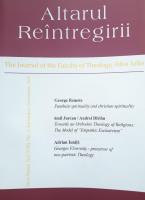Towards an Orthodox Theology of Religions: The Model of “Empathic Exclusivism”
Towards an Orthodox Theology of Religions: The Model of “Empathic Exclusivism”
Author(s): Emil Jurcan, Andrei DîrlăuSubject(s): Christian Theology and Religion, Theology and Religion, Eastern Orthodoxy
Published by: Facultatea de Teologie Ortodoxă Alba Iulia
Keywords: Theology of Religions; Empathic Exclusivism; taxonomies; Orthodox theology;
Summary/Abstract: The paper claims that the discipline called “History and Philosophy of Religions” (HPR, abbreviated IFR in Romanian), as currently taught in Romanian Faculties of Orthodox Theology, is inadequate and insufficient. Its methodological approach does not meet the educational requirements of future Orthodox priests and theologians. IFR is (more or less implicitly) based on the tripartite methodology used by Mircea Eliade: historical, phenomenological, hermeneutical. This is simply not enough. While it may be maintained as a foundation, an additional discipline needs to be introduced in the curriculum: the Orthodox Theology of Religions. A few taxonomies of the discipline “Theology of Religions” are briefly presented, as proposed by heterodox theologians during the last decades in order to classify the existing approaches. The well-known threefold paradigm (Alan Race) – exclusivism (Kraemer, Newbigin, Barth), inclusivism (Rahner, Dupuis, Pannenberg, Farquhar), pluralism (Hick, Knitter, Panikkar, Troeltsch, Küng) – is followed by the fourfold one (Knitter) (replacement, fulfilment, mutual enrichment, acceptance), and variations thereof (DiTora, D’Costa). Short but clearcut critiques of inclusivist and pluralist heresiesare included. Reference is also made to the Extra Ecclesiam nulla salus and Ecclesia ab Abel theses. The promising approach of Comparative Theology (J. Fredericks, F. Clooney, J. Berthrong, R.C. Neville, D. Burrell, L. Lefubre, P. Valkenberg, M. Barnes, J. Keenan, S. Painadath, F. Veneeth, J. Pathrapankal, K. von Stosch) is also introduced. Finally the paper proposes an outline of what could be an Orthodox approach: the “Empathic Exclusivism” model: salvation is only in Christ, like in the exclusivist model. Christianity isuniquely based on the divine revelation through the Incarnation.The other religions have no salvific value per se, they are not ways of salvation. However, the attitude of the Orthodox toward the pagan believers is to be one of empathy, trying to identify, understand, and theologically interpret, in the light of Biblical and Patristic tradition, whatever “seeds of the Logos” (St Justin the Martyr) their religious traditions may have preserved from the original Adamic monotheism. The goal of such an approach is to facilitate Orthodox mission, aimed at helping to “graft” Christianity onto those traditions, and to bridge the cultural gap for pagans who wish to become Orthodox. This is a major challenge to Orthodox theology today.
Journal: Altarul Reîntregirii
- Issue Year: XXIII/2018
- Issue No: 3
- Page Range: 7-31
- Page Count: 31
- Language: English

